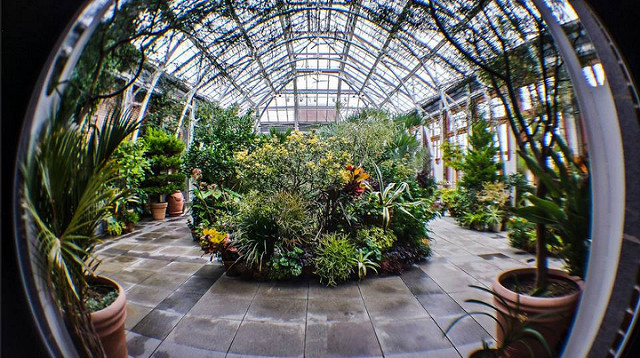
By Robert Burgess
Humankind has been searching for a fountain of youth for ages. A new study suggests it should be flowing with not water, but coffee.
Researchers this week published an article in the journal JAMA Internal Medicine that says in a study of nearly half-a-million British adults, coffee drinkers had a slightly lower risk of death over 10 years than abstainers. Overall, coffee drinkers were about 10 percent to 15 percent less likely to die than abstainers during a decade of follow-up.
The apparent longevity boost was seen with instant, ground and decaffeinated, results that echo U.S. research.

New England Botanic Garden at Tower Hill’s conservatories house subtropical plants in cold months, including a coffee plant. (Photo by Karen Brockney)
And it’s all thanks to the mighty coffea, a genus of flowering plants whose seeds, called coffee beans, are used to make various coffee beverages and products. If you search carefully in New England Botanic Garden at Tower Hill’s conservatories during the cold weather months, you can find a coffee plant growing in a container. We don’t harvest enough beans to get a brew on, but it’s our way of highlighting the plant that keeps us humming, and, apparently, alive longer.
So how exactly is coffee increasing longevity? The Associated Press reported:
It’s not clear exactly how drinking coffee might affect longevity. Lead author Erikka Loftfield, a researcher at the U.S. National Cancer Institute, said coffee contains more than 1,000 chemical compounds including antioxidants, which help protect cells from damage.
Other studies have suggested that substances in coffee may reduce inflammation and improve how the body uses insulin, which can reduce chances for developing diabetes. Loftfield said efforts to explain the potential longevity benefit are continuing.
Now that we know coffee is so important, or at least not a vice, let’s see if we can figure out a way save the crop from the threat of climate change. Because we’re going to need the caffeine boost to stay up late solving that problem for sure.
Robert Burgess is the public relations manager for New England Botanic Garden at Tower Hill.
